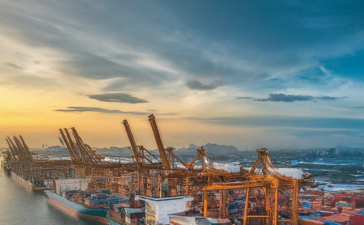The Asian Development Bank (ADB) expects Thailand to record the lowest growth among the six major Southeast Asian economies this year.
It has revised down its economic growth forecast to 4.1% from 4.5% compared with average growth of 5.5% for all six economies _ Thailand, Indonesia, Malaysia, the Philippines, Singapore and Vietnam.
The Japanese disaster and southern floods and mudslides are expected to reduce Thai economic growth by 0.3 to 0.4 percentage points this year.
ADB economist Luxmon Attapich said domestic demand would play a bigger role in economic growth this year amid only a slight improvement in exports.
The slowdown in export growth reflects a higher base this year.
Rising consumer price pressures stoked by upheavals in the Middle East and North Africa along with rising incomes such as from a higher minimum wage and increases in civil servants’ salaries in Thailand are the region’s top concerns.
“Asia will suffer an increase in inflationary pressure. Their central banks will attract more foreign capital inflows if they raise interest rates. Inflation needs to be handled with care,” said Dr Luxmon.
The Bank of Thailand will likely continue to raise its policy interest rate, now at 2.5%, over the next two years, she said.
“The government has gone in the right direction in raising inequality as a top economic agenda,” said Dr Luxmon.
“It is right to increase infrastructure interconnectedness between all the country’s regions. Decentralisation of the fiscal budget to provincial entities is also an important policy. The central government cannot do everything alone. It should also pursue measures such as a national savings fund and microfinance, which would strengthen the safety net.”
In a report entitled “Asian Development Outlook 2011” released on Wednesday, the ADB said the region could increase economic gains by improving South-South trade and investment links such as with Latin America, Africa and the Middle East. Trade among these regions has remained small while growing significantly.
The report also said South-South co-operation should focus on use of savings to finance investment in these regions rather than investing in traditional safe assets such as US bonds.
Craig Steffensen, the ADB’s new country director for Thailand, said the knock-on effect from the Japanese disaster on the Thai economy would be small in the short term but may intensify if supply chains of automotive and electronics goods are severely disrupted.
He said the ADB would continue its support of logistics development to link up countries in the Greater Mekong Subregion, which comprises Indochina, Thailand, Burma and Yunnan in China.
In Thailand, the ADB was asked by the government to provide technical assistance to improve the State Railway of Thailand in terms of finance, accounting and personnel management to help it improve services, said Mr Steffensen.
The ADB forecasts Asia-wide gross domestic product growth of 7.8% in 2011 and 7.7% in 2012, declining from 9% last year.
Source: Bangkok Post





